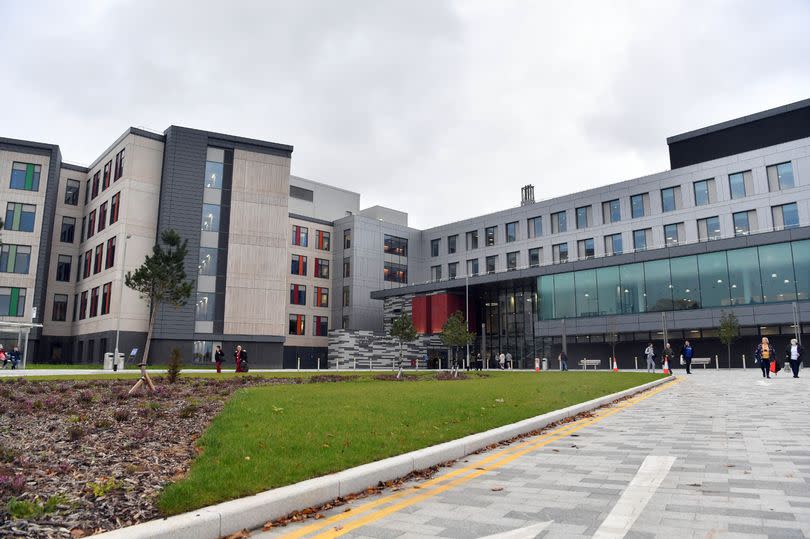Newborn baby dies three days after emergency C-section

A newborn baby died days after an emergency caesarean section following a seemingly healthy 39-week pregnancy. Marlow Betty died in her parents’ arms at the Grange University Hospital in Cwmbran on October 25 last year after a painful decision was made to turn off her life-support equipment.
An inquest at Newport Coroners' Court on Tuesday heard how on the morning of October 22, 2023, expectant mum Sophie Betty, from Pontypool, did her usual morning routine before a typical day with nothing out of the ordinary. She recalled feeling her baby moving as usual inside her at around 4pm with no cause for her to be concerned.
By 6pm coroner Caroline Saunders told the inquest how Ms Betty became concerned when she noticed the baby was no longer moving. She relayed her concerns to her husband Carl before calling the maternity triage team at The Grange hospital that evening.
READ MORE: Catalogue of safety failings contributed to death of young horsewoman
READ MORE: Chef dies after drinking bottle of Jack Daniel's
It was heard how Mrs Betty was advised to attend the department where she arrived just before 9pm. At 9.15pm it was heard how a maternity care assistant carried out checks on Mrs Betty, including a urine sample, which showed nothing of concern.
In a statement read out by Ms Saunders Mrs Betty recalled how staff appeared to be busy. Following her checks she said she waited around 40 minutes to be seen while a sensor was placed on her finger. For the latest Welsh news delivered to your inbox sign up to our newsletter.
At around 10.30pm it was heard how checks were carried out on the baby, which required a trained midwife. The tests revealed that baby Marlow had a slow heartbeat of around 60 beats per minute, which became weaker.
By 10.48pm the baby’s heartbeat was described as being “present but very low” triggering medics to rush Mrs Betty for an emergency C-section which happened at 10.51pm. Baby Marlow was delivered within less than a minute and appeared floppy and pale.
It was also revealed that a thick meconium was present – a sticky, tar-like substance which is the result of amniotic fluid passing through an unborn baby’s intestines. Although this can be triggered by distress there was no evidence to suggest what had caused it.
Medics tried a number of methods to resuscitate baby Marlow however it was heard how she remained pale and floppy. She was later transferred to a neonatal incubator.
Following discussions between medics and baby Marlow’s parents it was later decided that life support was no longer in her best interest. Baby Marlow died in her parents’ arms on the evening of October 25.
Ms Saunders called Jayne Beasley to give evidence during the inquest to ascertain if more could have been done to save baby Marlow. Mrs Beasley is a registered nurse and midwife and reviewed the care received.
She confirmed there had been no issues or causes for concern during Mrs Betty’s pregnancy until October 22. There was also “nothing untoward” that would have changed Mrs Betty’s care from being midwife-led to obstetric-led, she said.
Mrs Beasley described the triage unit at the time as being a three-bed unit where concerned expectant mothers could either be referred to or refer themselves to. She said it was run by two midwives and a maternity support worker. She described the unit at the time as “satisfactory” for the population it served and added how a new area has been added specifically for women who present with reduced foetal movement since baby Marlow’s death.
When asked by Ms Saunders if the baby should have been checked during Mrs Betty’s observations at 9.15pm Mrs Beasley said such checks would have needed to be carried out by a trained midwife and could not be carried out by an assistant. It was heard how there were other emergencies ongoing at the same time but ideally it would have been carried out within 30 minutes of Mrs Betty’s arrival to the hospital.
However Ms Saunders said in her summation that given the condition of baby Marlow prior to delivery it seemed unlikely that more timely observations would have changed the outcome. She said: “No assessment of the baby’s heartbeat was made within 30 minutes. I think that would have been the ideal [opportunity] and best practice. However I note no guidelines and staff were dealing with another emergency.” She added: “[I] can’t say that earlier intervention could have changed the outcome. I do not consider it would have.”
Ms Saunders said Mrs Betty received appropriate care throughout her pregnancy and that there were no delays once it was determined as an emergency situation. There were also no delays during the C-section surgery, she said.
She confirmed baby Marlow’s medical cause of death as 1a. multiple organ dysfunction and 1b. severe hypoxic ischaemic encephalopathy with its cause unknown. She concluded that baby Marlow died of natural causes.
Addressing Mrs and Mr Betty she said: “Thank you so much for coming today. I recognise how difficult it was to relive this event. Please accept my condolences.”

 Yahoo News
Yahoo News 
